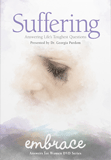Death, the Enemy: A Child and a Dead Opossum
A few years ago, my son came across a rotting opossum carcass on a hiking trail. He passionately recounted the experience to us later that day:
“It was really gross! Its eyeballs were gone, and I could see bugs crawling inside it, and it smelled awful. It was so sad!”
Without prompting, he knew something had gone very wrong for that particular little opossum.
Undoubtedly, the sight and smell of the dead opossum had disturbed him, but it was more than that. His reaction demonstrated intuitive repulsion and sorrow. Without prompting, he knew something had gone very wrong for that particular little opossum. I’ve never forgotten this episode and count it as another stone in the fortress of evidence that animal death is rightly regarded as a bad thing.
What Is Intuition?
Intuition is immediate knowing without rational thought or inference. Though we often hear it described as a “hunch” or a “funny feeling,” it is a legitimate form of knowledge. In the comprehensive philosophy text, Philosophical Foundations of a Christian Worldview (422), intuition is defined as “an immediate, direct awareness or acquaintance with something. An intuition is a mode of awareness-sensory, intellectual, or otherwise, in which something seems or appears to be directly present to one’s consciousness.” That is a complex way of saying that intuition is a valid form of knowledge that sees something as it really is; consequently, it should not be dismissed as merely irrational or emotional. It is fascinating that my son’s intuition concerning the dead opossum was both sensory and spiritual. He may not have known how he knew it was bad, but he knew it, nevertheless: with his eyes, nose, and heart.
Some may say that my son simply needs to learn more science; however, science cannot determine whether things are “good” or “bad.” When a scientist claims that animal death is “good” based on things like global benefits of bio-deposits, they’ve departed from their field. They can measure and study those deposits, but the moral nature of the cause of those deposits is a question science cannot touch. In that sense, intuition is a means of knowing things that science cannot tell us and is rightly regarded as a gift from God. God made us in his image (Genesis 1:27) enabling us to discern spiritual things. Children seem to possess a keen spiritual receptivity that is heightened in comparison to adults, who have often been calloused by negative experiences and media exposure.
Can We Trust the Intuition of a Child?
Intuition in an imperfect world is not a flawless guide (Proverbs 16:25). The only perfect guide for morals and values is divinely revealed truth in the Bible. We can trust the intuition of a child, insofar as it aligns with the teachings of Scripture. The Bible tells us that death is the consequence of sin (1 Corinthians 15:21) and that death is an enemy (1 Corinthians 15:26). Throughout the Bible, death is portrayed as an unwelcome and unfavorable part of our fallen world. The Bible confirms my son’s intuitive response to animal death and makes sense of his intensely negative reaction. My son’s intuition is, therefore, trustworthy—at least on this issue.
A Dead Opossum: Why Does It Matter?
Many believe the earth is millions of years old, holding to a secular geological timescale, which necessarily includes millions of years of animals suffering, dying, and rotting prior to the fall in the Garden of Eden. As the smelly carcass of a dead opossum is repulsive, so is such a misguided view. Such a view would have me deny my son’s reaction as immature or uneducated and encourage me to teach him to deny his God-given intuition. Most importantly, it disrupts the coherence of the Bible. God had declared his creation to be “very good” (Genesis 1:31) before the fall. A putrefying animal carcass covered in flies and exuding an abhorrent odor reminds us of the consequences of sin and the horror of rebellion against our Creator. There’s nothing good about death.
Thankfully, the Bible tells us we can have the hope of a day when the rotting opossum shall be no more.
Thankfully, the Bible tells us we can have the hope of a day when the rotting opossum shall be no more. Through the conquering death and resurrection of Jesus Christ on the Cross, death has been defeated (2 Timothy 1:10). I’m thankful for my son’s moral intuition concerning animal death and the witness it bears to the tragic results of the fall. May we submit to the Word of God in all things and train our children to rightly discern what God places before them on the trail of life.
Recommended Resources

Answers in Genesis is an apologetics ministry, dedicated to helping Christians defend their faith and proclaim the good news of Jesus Christ.
- Customer Service 800.778.3390
- Available Monday–Friday | 9 AM–5 PM ET
- © 2026 Answers in Genesis





